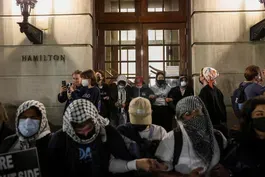
Why abortions are rising in U.S. despite more restrictions
Clip: 4/15/2025 | 7m 11sVideo has Closed Captions
Why abortions are rising in the U.S. despite more restrictions
Access to abortion services has shifted dramatically in the three years since the Supreme Court overturned Roe v. Wade. Twelve states currently ban the procedure with limited exceptions, another four have bans after six weeks of pregnancy. Stephanie Sy discussed a new report that shows whether bans have led to a drop in abortions with Mary Ziegler, author of “Personhood."
Problems with Closed Captions? Closed Captioning Feedback
Problems with Closed Captions? Closed Captioning Feedback
Major corporate funding for the PBS News Hour is provided by BDO, BNSF, Consumer Cellular, American Cruise Lines, and Raymond James. Funding for the PBS NewsHour Weekend is provided by...

Why abortions are rising in U.S. despite more restrictions
Clip: 4/15/2025 | 7m 11sVideo has Closed Captions
Access to abortion services has shifted dramatically in the three years since the Supreme Court overturned Roe v. Wade. Twelve states currently ban the procedure with limited exceptions, another four have bans after six weeks of pregnancy. Stephanie Sy discussed a new report that shows whether bans have led to a drop in abortions with Mary Ziegler, author of “Personhood."
Problems with Closed Captions? Closed Captioning Feedback
How to Watch PBS News Hour
PBS News Hour is available to stream on pbs.org and the free PBS App, available on iPhone, Apple TV, Android TV, Android smartphones, Amazon Fire TV, Amazon Fire Tablet, Roku, Samsung Smart TV, and Vizio.
Providing Support for PBS.org
Learn Moreabout PBS online sponsorshipWILLIAM BRANGHAM: Access to abortion has changed dramatically in the three years since the U.S. Supreme Court overturned Roe v. Wade.
Twelve states currently ban the procedure with limited exceptions, and another four have outright bans after six weeks of pregnancy.
Stephanie Sy looks at a new report that examines whether these bans have led to a drop in abortions, as supporters had hoped.
STEPHANIE SY: William, according to the latest data from the Guttmacher Institute, a research organization that advocates for abortion rights, there were just over a million clinician-provided abortions in states where it was legal in 2024.
The numbers were up slightly from the previous year.
The data further shows that the number of people who crossed state lines for the procedure dropped nearly 9 percent.
For an update on the current state of abortion access, I'm joined by Mary Ziegler, professor at U.C.
Davis.
She's written several books on abortion rights, including "Personhood," which is out later this month.
Mary Ziegler, thank you so much for joining the "News Hour."
So three years out from the Dobbs decision, several states have outright bans, and yet the number of abortions tallied by a Guttmacher has held steady, and other data shows abortions have increased more than 10 percent since 2020.
What is your reaction to this latest data?
MARY ZIEGLER, University of California, Davis, School of Law: It isn't surprising, in a sense.
We have seen that passing a ban and enforcing a ban are two very different things, particularly when both pills and people are crossing state lines in the way we have seen since 2022.
And I think the real question going forward is either whether states can project their power across state lines, for example, by prosecuting people in states where abortion rights are protected, or whether instead the Trump administration is going to impose some sort of national limit that changes the calculus.
Otherwise, I think we will likely continue to see data like these in the years to come.
STEPHANIE SY: And the Guttmacher Institute says the total number of abortions it tallied is likely an undercount because it doesn't reflect self-administered medication abortions in states where that practice is banned.
Is there any way to get a true sense of how many abortions are occurring in the current landscape?
And I ask this because the states that have banned abortions have the clear intent of reducing the number of abortions.
But can we really tell how many are occurring?
MARY ZIEGLER: Not really, right?
I mean, and this is not -- also not a surprise.
It was historically very hard to evaluate how many abortions were happening in America before Roe v. Wade.
And that's no surprise because, even if it's not a crime to take abortion pills, it can be a crime to facilitate the taking of abortion pills.
So even if someone in a state where abortion is a crime isn't themselves going to get in criminal trouble for taking those pills, they might be exposing other people in their lives to criminal charges if they say anything.
So this is almost certainly an undercount.
And it's very hard to get data when the penalties for doing these acts in some states are serious, right, up to life in prison in some instances.
STEPHANIE SY: I want to give you another data point of the example of Florida, where a six-week ban went into effect in May of 2024.
They saw the most dramatic drop in the procedure, with abortions in the state down by 12,000 last year.
Mary, is Florida an instance where the restrictions may be having the intended effect?
MARY ZIEGLER: Absolutely, in part because Florida was not just a place where people from the state were having abortions.
Florida was similar to New Mexico or Illinois.
It was a regional hub for people who lived in states that already had bans.
And so while we may see some Floridians circumventing the state's abortion ban by going elsewhere or ordering pills, we're not seeing people traveling to Florida for abortions because of the state's ban.
Also, I think the Southeast in particular is a place where travel for abortion is much harder.
There really are no nearby states geographically that logically come to mind as places one would go, which is why Virginia is the next on the list.
But Virginia is, of course, much more remote to some of these states than Illinois would be to certain states or New Mexico.
So that's I think part of what you're seeing.
Florida is no longer a regional hub in the same way.
STEPHANIE SY: I want to touch on the legal landscape.
We have seen years now of back-and-forth between state laws and courts.
In Idaho, a court recently expanded medical exemptions, as you know, to the state's ban.
And even Texas' legislature is looking at reworking language on medical exemptions in its ban.
Is there, Mary, a general pivot toward moderating some of the more strict abortion bans at this point?
MARY ZIEGLER: I think it's -- the pivot has been, as both the Texas legislature and the Kentucky legislature have put it, to clarify the bans.
There's not really an attempt so much to make abortion more available in those states as to clarify that legislatures already wanted it to be available under certain circumstances, and they believe physicians didn't know what those circumstances were.
We even saw that in the Idaho litigation where the Idaho attorney general's office essentially said, we have allowed some of these abortions all along.
I think we will continue to see back-and-forth about that, though, because it's still very hard to write laws that are actually clear and actually cover all the circumstances in which a pregnancy would become dangerous enough for the law to kick in.
That's especially true in the penalties we see authorized by these laws are so high that physicians are going to be really reluctant to take risks.
So I think these attempts at clarification are growing, but I'm not convinced they will work.
STEPHANIE SY: To that point, you also have proposed laws that some would say go to the extreme.
Again, in Texas, a bill has been filed that would force municipalities to test the water for the presence of hormones and mifepristone.
Are you seeing a lot of political will, especially in conservative states, for those types of efforts?
MARY ZIEGLER: I think there's a lot of frustration in conservative states about the inability to enforce these laws and the inability to stop abortions from happening.
And, of course, states can do but so much without the intervention of the Trump administration.
So there's a lot of spitballing happening in conservative states now about ways to make bans more effective than they currently are,all of them focused on abortion pills.
I don't know if the testing the groundwater solution is going to get off the ground in particular, but I think we will almost certainly see some legislation coming out of this session from the states that tries to shut down access to pills either by targeting out-of-state actors or in-state actors in ways we haven't seen before.
STEPHANIE SY: That is Mary Ziegler at U.C.
Davis.
Mary, thank you so much for joining us with your perspective.
MARY ZIEGLER: Thanks for having me.
China cuts exports of rare earth minerals amid trade war
Video has Closed Captions
Clip: 4/15/2025 | 7m 37s | China cuts exports of vital rare earth minerals as trade war with U.S. intensifies (7m 37s)
Grants frozen as Harvard pushes back against Trump's demands
Video has Closed Captions
Clip: 4/15/2025 | 6m 41s | Billions in grants frozen after Harvard pushes back against Trump's demands (6m 41s)
How college communities are reacting to funding threats
Video has Closed Captions
Clip: 4/15/2025 | 5m 34s | How college communities are reacting to funding threats, international student arrests (5m 34s)
Inside the camp where Sudanese refugees have fled civil war
Video has Closed Captions
Clip: 4/15/2025 | 9m 57s | Inside the crowded camp where Sudanese refugees have fled violence and hunger (9m 57s)
Judge presses DOJ on wrongfully deported man
Video has Closed Captions
Clip: 4/15/2025 | 8m 54s | Judge presses Trump administration on why it hasn't returned wrongfully deported man (8m 54s)
News Wrap: Iran leader downplays chance of nuclear deal
Video has Closed Captions
Clip: 4/15/2025 | 4m 58s | News Wrap: Iran's supreme leader downplays chance of deal from nuclear talks with U.S. (4m 58s)
Providing Support for PBS.org
Learn Moreabout PBS online sponsorshipSupport for PBS provided by:
Major corporate funding for the PBS News Hour is provided by BDO, BNSF, Consumer Cellular, American Cruise Lines, and Raymond James. Funding for the PBS NewsHour Weekend is provided by...
















